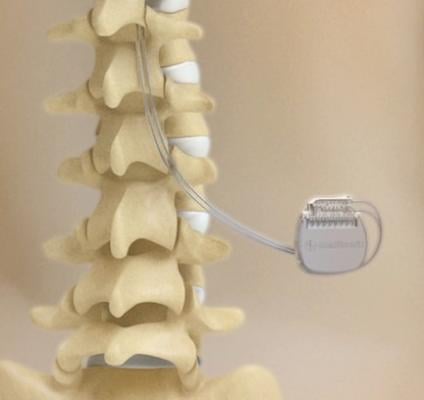
August 30, 2012 — Spinal cord stimulation (SCS) improves heart function and could become a novel treatment option for heart failure, according to research presented at the European Society of Cardiology Congress in Munich, Germany, by Hung-Fat Tse from Hong Kong.
Spinal cord stimulators are implanted neurostimulation devices that are similar in function and appearance to cardiac pacemakers. SCS therapy uses an implanted device and thin wires with electrodes to deliver low levels of electrical energy to the spinal cord.
In the study, thoracic neurostimulation was used to determine if there was an improvement in the left ventricular contractile (or pumping) function of the heart compared with medical therapy alone in the treatment of heart failure. Prior experimental studies have shown that the addition of intermittent thoracic SCS near the upper chest (at the level of thoracic vertebrae numbers T1-T2) improved left ventricular contractile function in animal models of ischemic heart failure.
The present experimental study compared the previously tested intermittent approach to a new continuous approach for SCS delivery. Pigs with ischemic heart failure were randomized into three groups: medical therapy only, intermittent SCS (four hours, three times a day) with medical therapy or continuous SCS (24-hour) with medical therapy. Medical therapy included ACE inhibitors and beta-blockers, medications that have been approved for use in heart failure and shown to reduce mortality.
After 10 weeks, echocardiograms showed similar and significant increases in left ventricular ejection fraction (EF) and increased ventricular contractile function in both groups of animals treated with intermittent or continuous SCS as compared with control group. “The EF is a measurement of how well the heart is pumping and represents the proportion of blood squeezed out of the heart with every beat,” said Tse, who is professor of cardiology in the cardiology division at Queen Mary Hospital, University of Hong Kong. “It is commonly used as a marker of prognosis, with a lower EF generally indicating a poorer prognosis. Our results indicate that both intermittent and continuous SCS improve heart function.”
Continuous SCS was associated with significant reduction of serum norepinephrine and brain natriuretic peptide compared with medical therapy alone. Said Tse: “Serum norepinephrine and brain natriuretic peptide are biomarkers that indicate the severity of heart failure. Our early findings suggest that continuous SCS may produce additional benefits over intermittent SCS.”
“Improving the heart’s pumping function is an important aspect of treating heart failure, and early research from this and other studies suggests that spinal cord stimulation could play an important role in aiding the heart’s contractions,” said Tse. “Our research suggests that SCS could provide an alternative treatment option for treating heart failure. Further research is needed to determine what approach would be most beneficial.”
For more information: www.escardio.org


 January 05, 2026
January 05, 2026 









